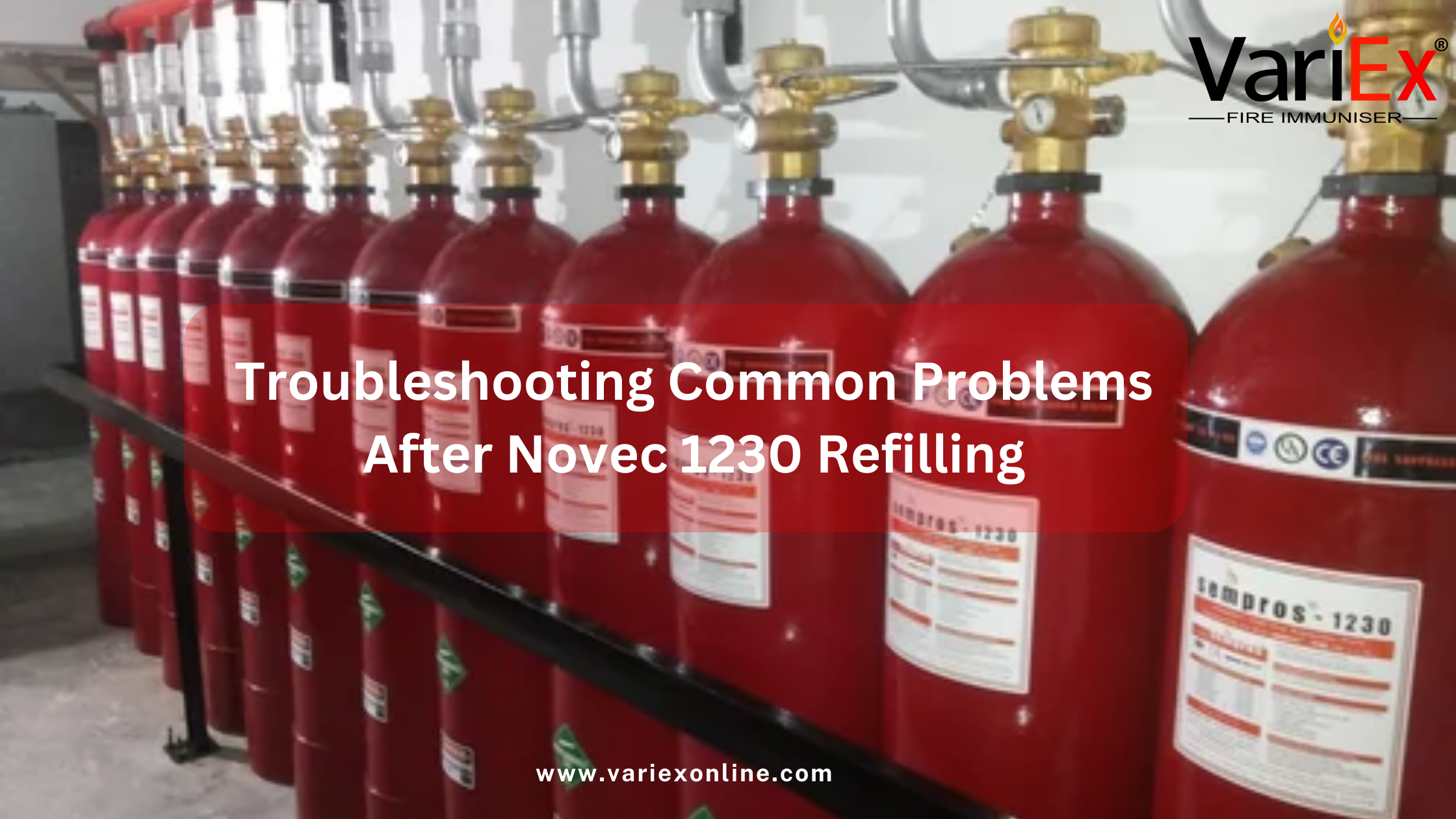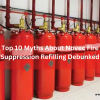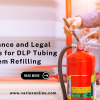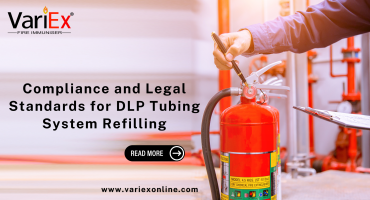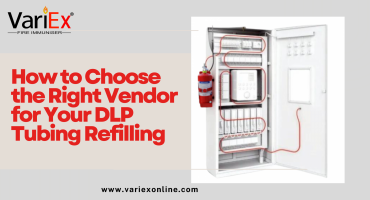![]()
Fire Immuniser
+91-7829629111
Email: info@variex.in
Varistor Technologies Pvt. Ltd.
Block-1, First Floor, Ardente Office One, Hoodi Circle, ITPL Main Road, Bengaluru, Karnataka 560048, IN
Troubleshooting Common Problems After Novec 1230 Refilling
Troubleshooting Common Problems After Novec 1230 Refilling
Refilling your Novec 1230 fire suppression system is essential to keeping your facility protected from fire hazards. But what happens after the refill? While Novec 1230 (FK-5-1-12) is one of the most reliable clean agents in the market, improper handling, installation errors, or missed checks during refilling can lead to post-refill performance issues.
In this SEO-optimized blog, we’ll walk you through the most common problems after a Novec 1230 refill, how to troubleshoot them effectively, and ensure your system is back to full operational readiness. Whether you manage a data center, server room, or high-value asset facility, this guide will help you identify, solve, and prevent refilling-related issues.
🔧 Why Post-Refill Troubleshooting Is Crucial
A successful Novec 1230 refill isn’t just about replacing the agent; it’s about restoring your system’s fire readiness, compliance, and reliability. Skipping post-refill testing or ignoring early warning signs can result in:
System malfunction during an actual fire
Non-compliance with NFPA 2001 and ISO 14520
Damage to critical equipment
Voided warranties and insurance claims
🚨 Common Problems After Novec 1230 Refilling
Here are the top issues you may face after refilling your Novec 1230 system and how to troubleshoot them:
1. Pressure Loss in Cylinders
Problem: The system shows a drop in cylinder pressure post-refill.
Possible Causes:
Minor leaks from valve seals or pipe joints
Improper agent-to-nitrogen mixing ratio
Overheating or undercooling of the storage room
Troubleshooting:
Perform a hydrostatic test on cylinders
Recheck pressure gauges and recalibrate if necessary
Conduct a leak detection test using soap solution or ultrasonic detector
2. System Alarm Activation Without Discharge
Problem: Control panel shows an alarm or fault even though there’s no fire or agent release.
Possible Causes:
Improper wiring reconnection after refilling
Faulty or untested detectors
Low pressure or system imbalance
Troubleshooting:
Reset and test the fire alarm control panel (FACP)
Verify end-of-line resistors and wiring continuity
Inspect and test smoke or heat detectors
3. Delayed or Incomplete Agent Discharge
Problem: Novec 1230 doesn’t discharge completely or takes longer than expected during a test.
Possible Causes:
Blockage in discharge piping
Inadequate pressure in agent cylinders
Faulty solenoid or actuator
Troubleshooting:
Flush discharge piping to remove blockages
Check discharge valve operation and solenoid function
Ensure agent was filled to correct weight and pressure
4. Leakage or Agent Odor in Protected Area
Problem: A faint chemical smell is present, or agent is detected outside the cylinder.
Possible Causes:
Improper cylinder valve tightening
Hose damage during installation
Accidental discharge during testing
Troubleshooting:
Inspect hose connections and O-rings for wear
Check for pinhole leaks in cylinders or pipes
Use gas detection tools to confirm active leakage
5. Control Panel Error Codes
Problem: Error or fault codes appear on the fire suppression control panel.
Possible Causes:
Disconnected signal cables
Incorrect programming post-refill
Low battery in control unit
Troubleshooting:
Refer to manufacturer manual for error code interpretation
Reset the panel and perform a full system diagnostic
Replace or recharge backup battery if needed
📊 Table: Quick Troubleshooting Reference for Novec 1230 Refilling Issues
| Issue | Possible Cause | Action to Take |
|---|---|---|
| Pressure loss in cylinder | Valve seal leak, improper pressurization | Check for leaks, recalibrate pressure, test with gauge |
| System alarm without discharge | Faulty wiring, low pressure, sensor malfunction | Reset panel, test sensors, inspect wiring |
| Incomplete discharge | Blocked nozzle, low pressure, actuator failure | Flush lines, verify solenoid, check cylinder weight |
| Leakage or odor | Loose fittings, hose damage, micro-leaks | Tighten fittings, use leak detection tools |
| Error codes on control panel | Software bug, battery failure, cable disconnect | System reset, check manual, replace components |
🧰 Best Practices to Prevent Post-Refill Issues
✅ Always use certified technicians for refilling and inspection.
✅ Verify agent weight and pressure before reinstalling cylinders.
✅ Perform a Room Integrity Test (RIT) to confirm gas retention.
✅ Keep the area clean and dry around the suppression equipment.
✅ Update refill documentation and system logs for audit purposes.
🔄 The Importance of Post-Refill System Testing
After every refill, conduct these essential system checks to prevent failures:
Cylinder Weight Check – Ensures correct volume of Novec 1230.
Discharge Test (Simulated) – Verifies activation sequence.
Pressure Verification – Confirms the system holds steady pressure.
Panel Reset and Diagnostics – Clears any existing faults.
Leak Test – Detects any slow leaks or seal failures.
👉 These steps help ensure your system is code-compliant, safe, and fully operational.
🧑🏭 Who Should Handle Novec 1230 Refills and Troubleshooting?
Only licensed, certified fire suppression professionals.
Must be trained in clean agent handling and NFPA 2001 standards.
Should carry testing tools like gas analyzers, pressure gauges, and leak detectors.
Avoid untrained staff attempting manual resets or cylinder handling, as this can void warranties and introduce safety risks.
🧠 Smart Tip: Use Preventive Maintenance Software
Invest in a fire system management platform that:
Tracks refill dates and cylinder conditions
Sends reminders for inspections
Logs every test and repair action
Ensures compliance with ISO/NFPA standards
This ensures no refilling or testing step is missed.
✅ Conclusion: Post-Refill Maintenance Is Just as Important as Refilling
Refilling your Novec 1230 system is not the finish line — it’s just the beginning of a new maintenance cycle. Identifying and troubleshooting post-refill issues ensures your system performs as expected when it’s needed most. From pressure imbalances to control panel glitches, each problem has a solution — but only if you know what to look for.
Don't wait for a fire to find out your suppression system isn't ready. Conduct tests, log your checks, and work with certified experts to ensure peak performance of your Novec 1230 system — every time.
Frequently Asked Questions
A minimal drop can happen due to temperature shifts, but anything beyond 5-10% should be investigated immediately.
Reset the system and run diagnostics. If the alarm persists, contact a certified technician for inspection.
Yes, but most tests are simulated to avoid wasting agent. Always test system functionality post-refill.
Immediately. All testing should be completed before bringing the system back online.
Yes. If a malfunction is traced to poor refilling practices, it may invalidate claims. Always use licensed professionals.
Final Say
At VariEx.in and VariexOnline.com, we specialize in supplying and installing top-quality fire fighting systems and equipment. From fire extinguishers to advanced suppression systems, we offer comprehensive solutions tailored to your needs. Our experienced team ensures precise installation and maintenance for optimal safety.
Trust VariEx for reliable fire protection. Contact us online or call 7829629111 to learn more.
We specialize in manufacturing, supplying, and distributing a comprehensive range of fire fighting equipment, including state-of-the-art fire extinguishers. Read our most searched blogs and find interesting information on topics such as how to use a fire extinguisher, how to calculate fire fighting water tank capacity, fire extinguisher refilling, obtaining a Fire NOC, understanding fire fighting systems, types of fire protection systems, the fire hydrant system, and the fire sprinkler system. These resources provide essential knowledge for ensuring safety and compliance with fire safety regulations. Additionally, you can explore guides on the maintenance of fire protection equipment, the latest advancements in fire safety technology, and best practices for fire risk assessment and management.
Our expertise extends to fire alarm systems, fire hydrant systems, and fire suppression systems, including fire sprinklers. Each product meets rigorous international standards for reliability and performance, ensuring effective fire safety products tailored to diverse applications and industries. Additionally, we are providing Fire Extinguisher Refilling and AMC services to ensure ongoing maintenance and operational readiness of fire safety equipment.
"WHAT YOU CAN READ NEXT"
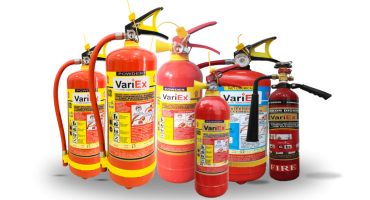 Read more +24 November 2023 in Fire Extinguisher
Read more +24 November 2023 in Fire ExtinguisherWhat types of fire extinguishers are available for different fire classes?
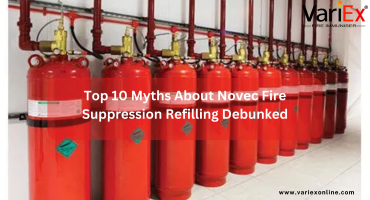 Read more +18 April 2025 in Fire Suppression
Read more +18 April 2025 in Fire Suppression

